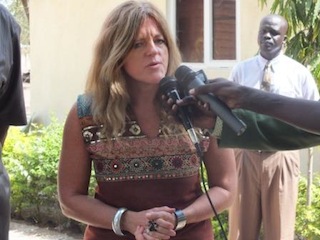UNMISS head opens new civilian protection site in Malakal
June 9, 2014 (MALAKAL) – The head of the United Nations mission in South Sudan (UNMISS), Hilde F. Johnson on Monday inaugurated a new site for the protection of civilians (PoC), situated adjacent to the UN base in Upper Nile state capital Malakal.

Johnson, while opening the site, hailed the existing cooperation between UNMISS and its humanitarian partners.
“As long as people feel afraid, they can know they have our protection,” said the SRSG during a ceremony in the context of the inauguration of the new PoC site,” said Johnson.
“That commitment remains and UNMISS has received a new mandate from the UN Security Council where protection of civilians is not only important, it’s a top priority”, she added.
Meanwhile, of the estimated 19,000 civilians currently living inside the mission’s Malakal facilities, slightly over 3,100 had reportedly already moved to the new PoC site as of 7 June.
The mission opened its gates to all unarmed civilians facing an imminent threat of physical violence when the crisis in South Sudan erupted in the capital, Juba on 15 December 2013.
Currently, however, over 93,000 civilians are reportedly living in 10 of the mission’s compounds nationwide, the largest number of IDPs to be housed by UNMISS since hostilities forced hundreds of thousands of South Sudanese residents to flee their homes.
KIIR-MACHAR MEETING
Johnson also expressed optimism about Tuesday’s meeting in Ethiopia between president Salva Kiir and opposition leader, Riek Machar.
“We really hope that progress will be made so that there will be full compliance with the cessation of hostilities agreement and major steps are taken towards comprehensive peace”, she remarked.
“Ultimately, it is peace and stability that will permit people to feel safe enough to return to their communities and neighborhoods”.
(ST)
